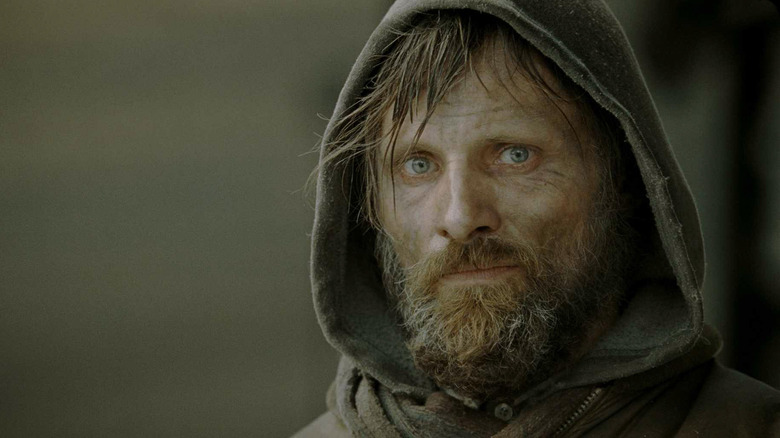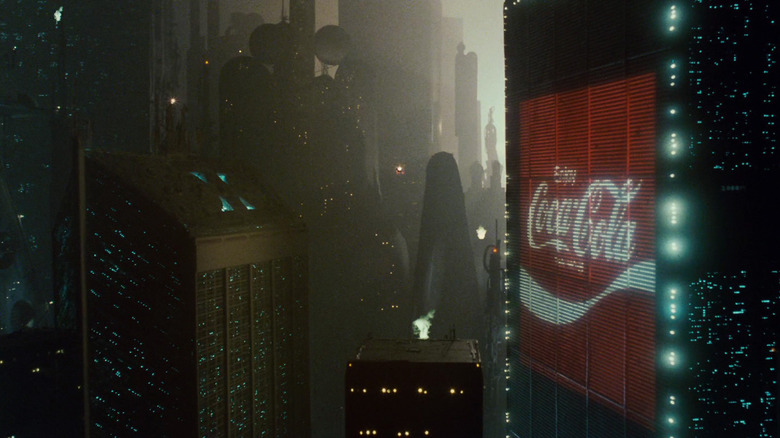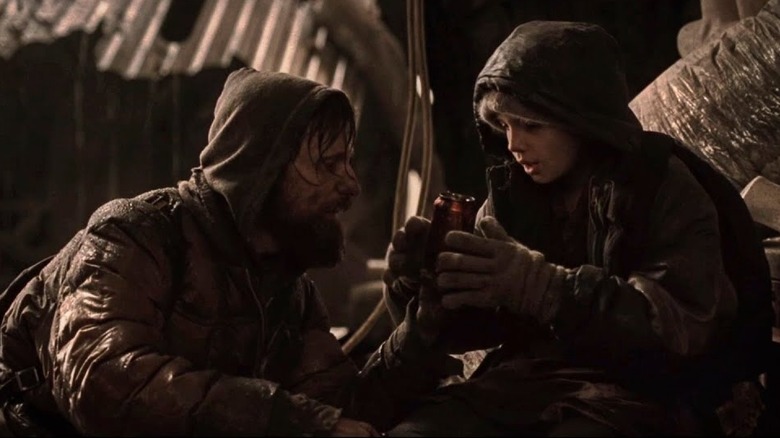Why Viggo Mortensen Fought Fiercely To Get A Can Of Coca-Cola Into The Road
Adapting a movie from a novel can be a monumentally difficult task. While in the print medium, an author has almost complete freedom to write what they want, films are far more collaborative efforts, filtering the vision of one person into the work of many.
This challenge is only amplified when you're handling the works of Cormac McCarthy, one of the greatest living authors. McCarthy's work is dark and uniquely written, making adaptations complicated, if not impossible. "Blood Meridian," one of McCarthy's most notable works, has been in production purgatory for years and is considered by some to be unfilmable. Even with the McCarthy stories that have been successfully adapted, for every massive success, like the Coen brothers' "No Country for Old Men," there's been an abysmal failure, like Billy Bob Thornton's "All the Pretty Horses."
John Hillcoat's adaptation of "The Road" is generally one of the better-received of these films. While, like any adaptation, the film makes changes and takes liberties with its source material, it manages to very adequately capture the book's mood and tone. The film has a silent tension to it, with scarce dialogue and a dark setting that reflects the book it's based on.
In one specific case, the film was able to stay loyal to the book due to the persistence of its star, Viggo Mortensen. According to a 2009 Today interview, Mortensen asked special permission from the Coca-Cola Company to include a can of their soda in the film in an attempt to stay loyal to a pivotal scene in the novel that also featured a can of Coke.
An iconic brand
At the risk of offending the vocal portion of our reader base who are staunch Pepsi loyalists, Coca-Cola is one of the most iconic brands on the planet. A Fortune 500 company with a massive market share of over 46 percent, and massive advertising campaigns that feature the likes of Martin Scorsese, there's hardly anybody in the world who wouldn't recognize the company's logo.
Because of the corporation's success and longevity, Coca-Cola has long been a symbol of American excellence and happiness. Its sentimental advertising campaigns have spent years making sure Americans associated the brand with warmth and familiarity. Its bottle is a pop culture icon in its own right, a staple in American media that has accompanied legends from Elvis Presley to Marilyn Monroe. Coca-Cola's ubiquity has also long been reflected in popular culture. Coca-Cola signs have appeared in both 1978's "Superman" and "Blade Runner," while "E.T. the Extra-Terrestrial” features many different cameos by the drink.
But according to the Today interview, when "The Road" called for a can of Coca-Cola to be featured, the production hit a roadblock. Even a company that's been all over our films and television has rules, and the Coca-Cola Company did not want their drinks featured in R-rated movies. This created a problem for the film, as the scene where the protagonists come across a can of Coke is one of the most affecting in the novel, a symbol for the rediscovery of the simple comforts of a world long gone. Without it, the scene would lose some of its prescience. Viggo Mortensen wouldn't stand for that.
The last vestige of American empire
"The Road" centers on a father and son, who travel the road after an apocalyptic event that leaves most of the world's plant and animal life dead. The two wander around, seeking refuge from the cannibalistic gangs that roam around. When the two find a can of Coke, it leads to a scene of wistful reflection, a reminder of the world before it ended.
According to the Today interview, Viggo Mortensen, fresh off "The Lord of the Rings" and ready to shift courses in his acting career, was shocked they were not going to use actual Coca-Cola in the scene.
"We were approaching the day we were going to shoot that scene, which I was looking forward to, and they said, 'we're not going to be able to use Coke. We'll have to use ... Brand X soda or something.' I said that's not the same thing. Coke is so iconic around the world. It's a symbol of America, of a certain way of life."
So, Mortensen took it upon himself to contact an executive of the Coca-Cola Company, explaining the brand's necessity to the scene and the potential free advertising the film could provide the company. Ultimately, they got approval, and the Coke can appeared in the film.
And thank goodness Mortensen did fight for it because it truly does make the scene. That can of Coke isn't just another resource the father and son scavenge. It's one of the last vestiges of their previous lives, a product representative of the bounty and excess of the United States that has now fallen. The Coke can is the symbol of a country that no longer exists, a piece of the ruins of a fallen empire.


